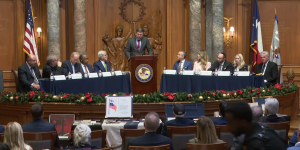Blog Post
A History of Commitment to Indian Country
Today, Associate Attorney General Tom Perrelli spoke at the Pueblo Cultural Center in Albuquerque, New Mexico about the recent spate of grants being awarded in Indian Country. It's an issue the Associate Attorney General has spent a great deal of time on in recent months, and one that, he acknowledges, he has a history with.
From his remarks:
I often speak about my personal interest in criminal justice in Indian Country. In fact, both the Deputy Attorney General. David W. Ogden, and I were very involved in Indian Country law enforcement initiatives in our previous roles in the Reno Justice Department. But returning a decade later to the Department, I see how much remains to be done. This has been echoed in our discussions with tribal leaders and experts in the past several weeks. Public safety in Indian Country requires our urgent attention. Violent crime in much of Indian Country is staggering, and its effects on the everyday lives of tribal communities are unacceptable. Our tribal nations face enormous law enforcement challenges, particularly with respect to violent crime, violence against women, and crimes against children. While tribal nations accomplish a tremendous amount with the resources they have, those resources are wholly inadequate to the serious criminal justice problems they face each day.
That brings me to the second reason I am here today. We’ve done a lot of listening, and we will continue to listen. But it’s also time we put actions behind our words. That is why I am honored to announce that the Department of Justice is awarding more than $82.29 million to pueblos and reservations in New Mexico and Navajo Nation today.
When we look at today’s funding – we see the most critical areas in need:
You can read the full remarks, here.- More than $79.6 million to construct and renovate correction facilities in areas with bed space needs and high rates of violent crime;
- More than $1.23 million to support pueblos and tribes’ efforts to respond to violent crimes against American Indian women and enhance victim safety and prevention strategies;
- More than $325,000 to create sex offender registries to protect our young children from predators; and
- More than $1 million to help tribal communities improve their juvenile justice systems, including prevention and mental health services.
Updated April 7, 2017
Component

 U.S. Department
of Justice
U.S. Department
of Justice

